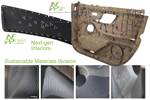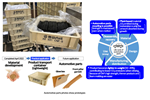Sumika, Hexagon digitize sustainable compounds, enable 60% carbon reduction for new vehicles
Digitized mechanical and environmental performance of recycled short glass fiber-reinforced PP compounds supports the transition to more sustainable vehicles.
Hexagon’s Manufacturing Intelligence division (Cobham, U.K.) and Sumika Polymer Compounds Europe (SPC Europe, Hampshire, U.K.), a manufacturer of thermoplastic compounds, have partnered to digitize the performance of new sustainable automotive-grade polypropylene (PP) compounds, enabling engineers to design components that are more recyclable and offer a lower carbon footprint for future vehicles.
SPC Europe’s short glass fiber-reinforced polypropylene (GF-PP) Thermofil HP and recycled polypropylene (GF-rPP) Thermofil Circle materials are said to benefit from sustainable manufacturing and recycling processes, offering carmakers performance equivalent to incumbent engineering plastics, but with an up to 60% lower carbon footprint. According to the company, a growing proportion of today’s PP components are recovered and recycled compared to polyamides (PA), of which up to 70% are used in waste-to-energy initiatives or finish up in landfill, and there remains substantial room for improvement. SPC Europe’s novel recycled PP compounds are designed for the circular economy, contributing to plastic waste reduction at vehicle end of life (EOL).
The automotive industry’s shift to e-mobility has increased the need for lightweighting components to maximize the energy efficiency of vehicles and mitigate the considerable weight of battery packs, but their environmental performance throughout the vehicle’s lifecycle must also be considered by product development teams. Thus, the long-term partnership between Hexagon and SPC Europe to provide these teams the ability to evaluate the suitability of GF-PP compounds in new designs to address these carbon-neutral targets, while reducing physical material testing and prototyping.
“Limited material behavior data is a barrier to sustainable e-mobility innovations because automotive engineering teams have not been able to put new materials through the rigorous virtual durability and safety tests required for automotive endorsement,” Guillaume Boisot, head of the Materials Centre of Excellence at Hexagon, says. “Our unique multiscale material modeling technology accelerates the adoption of SPC Europe’s recycled materials by making it possible for product development teams to accurately simulate a component and subject it to established automotive engineering test and validation.”
Hexagon conducted a detailed and rigorous testing and physical validation program with SPC Europe to produce highly accurate multiscale behavioral models of its Thermofil HP grades and Thermofil Circule of recycled PP grades. Each material grade has a model that simulates the materials’ mechanical and environmental performance throughout a component’s lifecycle. The encrypted proprietary material models can be accessed by SPC Europe customers through Hexagon’s Digimat software. Digimat is interoperable with computer-aided engineering (CAE) software tools, such as MSC Nastran, Marc and third-party software, empowering engineers to perform accurate analyses using established digital engineering workflows.
Related Content
-
Composites end markets: Automotive (2024)
Recent trends in automotive composites include new materials and developments for battery electric vehicles, hydrogen fuel cell technologies, and recycled and bio-based materials.
-
Thermoplastic composites: Cracking the horizontal body panel nut
Versatile sandwich panel technology solves decades-long exterior automotive challenge.
-
SMC composites progress BinC solar electric vehicles
In an interview with one of Aptera’s co-founders, CW sheds light on the inspiration behind the crowd-funded solar electric vehicle, its body in carbon (BinC) and how composite materials are playing a role in its design.

















